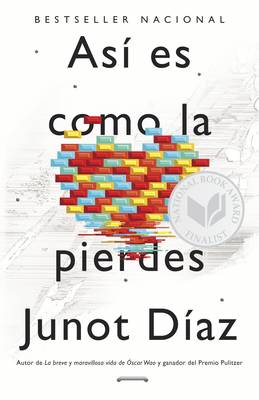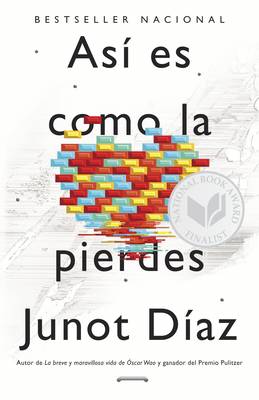
- Afhalen na 1 uur in een winkel met voorraad
- Gratis thuislevering in België vanaf € 30
- Ruim aanbod met 7 miljoen producten
- Afhalen na 1 uur in een winkel met voorraad
- Gratis thuislevering in België vanaf € 30
- Ruim aanbod met 7 miljoen producten
Zoeken
€ 24,95
+ 49 punten
Omschrijving
Así es como la pierdes es un libro sobre mujeres que quitan el sentido y sobre el amor y el ardor. Y sobre la traición porque a veces traicionamos lo que más queremos, y también es un libro sobre el suplicio que pasamos después -los ruegos, las lágrimas, la sensación de estar atravesado un campo de minas- para intentar recuperar lo que perdimos. Aquello que creíamos que no queríamos, que no nos importaba. Estos cuentos nos enseñan las leyes fijas del amor: que la desesperanza de los padres, la acaban sufriendo los hijos, que lo que les hacemos a nuestros ex amantes nos lo harán inevitablemente a nosotros, y que aquello de "amar al prójimo como a uno mismo" no funciona bajo la influencia de Eros. Pero sobre todo, estos cuentos nos recuerdan que el ardor siempre triunfa sobre la experiencia, y que el amor, cuando llega de verdad, necesita más de una vida para desvanecerse.
ENGLISH DESCRIPTION Finalist for the 2012 National Book Award
A Time and People Top 10 Book of 2012Finalist for the 2012 Story PrizeChosen as a notable or best book of the year by The New York Times, Entertainment Weekly, The LA Times, Newsday, Barnes & Noble, Amazon, the iTunes bookstore, and many more...
"Electrifying." -The New York Times Book Review
"Exhibits the potent blend of literary eloquence and street cred that earned him a Pulitzer Prize... Díaz's prose is vulgar, brave, and poetic." -O Magazine
From the award-winning author, a stunning collection that celebrates the haunting, impossible power of love.
On a beach in the Dominican Republic, a doomed relationship flounders. In a New Jersey laundry room, a woman does her lover's washing and thinks about his wife. In Boston, a man buys his love child, his only son, a first baseball bat and glove. At the heart of these stories is the irrepressible, irresistible Yunior, a young hardhead whose longing for love is equaled only by his recklessness--and by the extraordinary women he loves and loses.
In prose that is endlessly energetic, inventive, tender, and funny, these stories lay bare the infinite longing and inevitable weakness of the human heart. They remind us that passion always triumphs over experience, and that "the half-life of love is forever."
ENGLISH DESCRIPTION Finalist for the 2012 National Book Award
A Time and People Top 10 Book of 2012Finalist for the 2012 Story PrizeChosen as a notable or best book of the year by The New York Times, Entertainment Weekly, The LA Times, Newsday, Barnes & Noble, Amazon, the iTunes bookstore, and many more...
"Electrifying." -The New York Times Book Review
"Exhibits the potent blend of literary eloquence and street cred that earned him a Pulitzer Prize... Díaz's prose is vulgar, brave, and poetic." -O Magazine
From the award-winning author, a stunning collection that celebrates the haunting, impossible power of love.
On a beach in the Dominican Republic, a doomed relationship flounders. In a New Jersey laundry room, a woman does her lover's washing and thinks about his wife. In Boston, a man buys his love child, his only son, a first baseball bat and glove. At the heart of these stories is the irrepressible, irresistible Yunior, a young hardhead whose longing for love is equaled only by his recklessness--and by the extraordinary women he loves and loses.
In prose that is endlessly energetic, inventive, tender, and funny, these stories lay bare the infinite longing and inevitable weakness of the human heart. They remind us that passion always triumphs over experience, and that "the half-life of love is forever."
Specificaties
Betrokkenen
- Auteur(s):
- Uitgeverij:
Inhoud
- Aantal bladzijden:
- 208
- Taal:
- Spaans
Eigenschappen
- Productcode (EAN):
- 9780345805249
- Verschijningsdatum:
- 4/06/2013
- Uitvoering:
- Paperback
- Formaat:
- Trade paperback (VS)
- Afmetingen:
- 139 mm x 197 mm
- Gewicht:
- 213 g

Alleen bij Standaard Boekhandel
+ 49 punten op je klantenkaart van Standaard Boekhandel
Beoordelingen
We publiceren alleen reviews die voldoen aan de voorwaarden voor reviews. Bekijk onze voorwaarden voor reviews.











